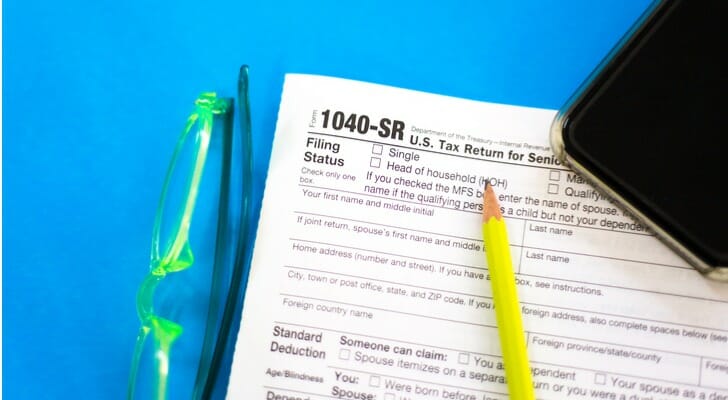If you receive Social Security disability benefits, you may wonder whether you get a 1099 form for reporting your income. The Social Security Administration issues Form SSA-1099 to recipients of Social Security Disability Insurance, which details the total benefits received in a year. However, those receiving Supplemental Security Income (SSI) do not get a 1099, as SSI is not taxable. Whether taxes apply to SSDI benefits depends on overall income, with federal taxation starting at certain income thresholds. Some states also tax disability benefits, while others do not, making it helpful to check state-specific rules.
A financial advisor can help you plan around your Social Security income and incorporate it into a comprehensive financial plan. Connect with a fiduciary advisor today.
What Is Social Security Disability Insurance?
The Social Security Disability Insurance (SSDI) program pays benefits to eligible people who have become disabled. To be considered eligible for Social Security disability benefits, you have to be “insured,” which means you worked long enough and recently enough to accumulate benefits based on your Social Security taxes paid.
You also have to meet the Social Security Administration’s definition of disabled. To be considered disabled, it would have to be determined that you can no longer do the kind of work you did before you became disabled and that you won’t be able to do any other type of work because of your disability. Your disability must have lasted at least 12 months or be expected to last 12 months.
Social Security disability benefits are distinct from Supplemental Security Income (SSI) and Social Security retirement benefits. SSI benefits are paid to people who are aged, blind or disabled and have little to no income. These benefits are designed to help meet basic needs for living expenses. Social Security retirement benefits, on the other hand, are paid out based on your past earnings, regardless of disability status.
SSI generally isn’t taxed because it’s a needs-based benefit. The people who receive these benefits typically don’t have enough income to require tax reporting. Social Security retirement benefits, meanwhile, are taxable federally once your combined income reaches certain thresholds.
Is Social Security Disability Taxable?
This is an important question to ask if you receive Social Security disability benefits and the short answer is, it depends. For the majority of people, these benefits are taxable but they don’t end up having to pay a tax on them. But you may pay a tax on your Social Security disability benefits if you’re also receiving income from another source or your spouse is receiving income.
The good news is that there are thresholds you have to reach before your Social Security disability benefits become taxable. So, if these benefits are your sole source of income then you likely won’t have to worry about it. You’ll generally have a tax owed on the benefits if your annual income is over $25,000 as an individual or over $32,000 as a married couple.
When Is Social Security Disability Taxable?

The IRS says that Social Security disability benefits may be taxable if your combined income – one-half of your benefits, plus all your other income – is greater than a certain amount, which is based on your tax filing status. Even if you’re not working at all because of a disability, other income you’d have to report includes unearned income such as tax-exempt interest and dividends.
If you’re married and file a joint return, you also have to include your spouse’s income to determine whether any part of your Social Security disability benefits are taxable. This is true even if your spouse isn’t receiving any benefits from Social Security.
The IRS sets the threshold for taxing Social Security disability benefits at the following limits:
- $25,000 if you’re single, head of household, or qualifying widow(er),
- $25,000 if you’re married filing separately and lived apart from your spouse for the entire year,
- $32,000 if you’re married filing jointly,
- $0 if you’re married filing separately and living with your spouse at any time during the tax year.
This means that if you’re married and file a joint return, you can report a combined income of up to $32,000 before you’d have to pay taxes on Social Security disability benefits. There are two different tax rates the IRS can apply, based on how much income you report and your filing status.
If you’re single and file an individual return, you’d pay taxes on:
- Up to 50% of your benefits if your income is between $25,000 and $34,000
- Up to 85% of your benefits if your income is more than $34,000
If you’re married and file a joint return, you’d pay taxes on:
- Up to 50% of your benefits if your combined income is between $32,000 and $44,000
- Up to 85% of your benefits if your combined income is more than $44,000
In other words, the more income you have individually or as a married couple, the more likely you are to have to pay taxes on Social Security disability benefits. In terms of the actual tax rate that’s applied to these benefits, the IRS uses your marginal tax rate. So you wouldn’t be paying a 50% or 85% tax rate; instead, you’d pay your ordinary income tax rate based on whatever tax bracket you land in.
It’s also important to note that you could be temporarily pushed into a higher tax bracket if you receive Social Security disability back payments. These back payments can be paid to you in a lump sum to cover periods where you were disabled but were still waiting for your benefits application to be approved. The good news is you can apply some of those benefits to past years’ tax returns retroactively to spread out your tax liability. You’d need to file an amended return to do so.
Is Social Security Disability Taxable at the State Level?
Besides owing federal income taxes on Social Security disability benefits, it’s possible that you could owe state taxes as well. As of 2025, 12 states imposed some form of taxation on Social Security disability benefits. The nine states where your disability benefits might be taxed, under some situations, are:
- Colorado
- Connecticut
- Minnesota
- Montana
- New Mexico
- Rhode Island
- Utah
- Vermont
- West Virginia
Each state applies the tax differently. States allow for certain exemptions or exclusions and at least one state, West Virginia, is phasing out Social Security benefits taxation by Jan. 1, 2026. Kansas, Missouri and Nebraska all previously taxed Social Security income, but have since repealed those taxes.
Do You Get a 1099 for Disability Income?
If you receive Social Security disability benefits, the Social Security Administration issues Form SSA-1099 each year, showing the total benefits paid. This form is used to report disability income on your tax return and determine whether any portion is taxable. However, individuals receiving SSI do not get a 1099, as SSI benefits are not taxable and do not need to be reported to the IRS.
If you lose or misplace your SSA-1099, you can request a replacement through the Social Security Administration’s website, by calling their office, or by visiting a local branch. The online option allows you to download an electronic copy, while mailed replacements typically arrive within 10 days.
The SSA-1099 is usually available by January, giving recipients time to prepare their taxes. If you receive SSDI but have not gotten your 1099, verifying your mailing address with the SSA can help avoid delays.
How to Report SSDI Benefits on Your Taxes
When filing your tax return, SSDI)benefits are reported using Form SSA-1099, which the Social Security Administration issues annually. The total benefits received for the year appear in Box 5 of this form.
To report SSDI on your tax return, enter the amount from Box 5 on line 6a of Form 1040 or 1040-SR. If any portion of your benefits is taxable, enter the taxable amount on line 6b. The IRS provides a worksheet in the tax instructions to help determine how much, if any, is taxable.
If you had federal income tax withheld from your SSDI payments, this amount appears in Box 6 of your SSA-1099 and should be reported on line 25b of Form 1040. Filing electronically can simplify calculations and reduce errors.
Bottom Line

Social Security disability benefits are taxable, but you may not owe taxes on them if you have less income than the set thresholds. If you’re worried about how receiving disability benefits while reporting other income might affect your tax bill, talking to a tax professional can help. They may be able to come up with strategies or solutions to minimize the amount of taxes you’ll end up owing.
Tips on Taxes
- A financial advisor could help you make the most of your Social Security disability benefits and other income. Finding a financial advisor doesn’t have to be hard. SmartAsset’s free tool matches you with financial advisors who serve your area, and you can have a free introductory call with your advisor matches to decide which one you feel is right for you. If you’re ready to find an advisor who can help you achieve your financial goals, get started now.
- While you don’t have to reach a specific age to apply for Social Security disability benefits or Supplemental Security Income benefits, there is a minimum age for claiming Social Security retirement benefits. A Social Security calculator can help you decide when you should retire.
Photo credit: ©iStock.com/kate_sept2004, ©iStock.com/JannHuizenga, ©iStock.com/AndreyPopov
